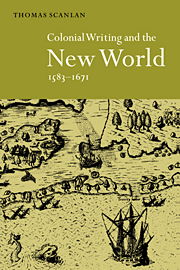Book contents
- Frontmatter
- Contents
- List of illustrations
- Acknowledgments
- Introduction
- 1 The allegorical structure of colonial desire
- 2 Fear and love: two versions of Protestant ambivalence
- 3 Forgoing the nation: the Irish problem
- 4 Preaching the nation: the sermon as promotion
- 5 Love and shame: Roger Williams and A Key into the Language of America
- 6 Fear and self-loathing: John Eliot's Indian Dialogues
- Coda
- Notes
- Index
Coda
Published online by Cambridge University Press: 04 December 2009
- Frontmatter
- Contents
- List of illustrations
- Acknowledgments
- Introduction
- 1 The allegorical structure of colonial desire
- 2 Fear and love: two versions of Protestant ambivalence
- 3 Forgoing the nation: the Irish problem
- 4 Preaching the nation: the sermon as promotion
- 5 Love and shame: Roger Williams and A Key into the Language of America
- 6 Fear and self-loathing: John Eliot's Indian Dialogues
- Coda
- Notes
- Index
Summary
And as the moon rose higher the inessential houses began to melt away until gradually I became aware of the old island here that flowered once for Dutch sailors' eyes – a fresh, green breast of the new world. Its vanished trees, the trees that had made way for Gatsby's house, had once pandered in whispers to the last and greatest of all human dreams; for a transitory enchanted moment man must have held his breath in the presence of this continent, compelled into an aesthetic contemplation he neither understood nor desired, face to face for the last time in history with something commensurate to his capacity for wonder.
And as I sat there, brooding on the old unknown world, I thought of Gatsby's wonder when he first picked out the green light at the end of Daisy's dock. He had come a long way to this blue lawn and his dream must have seemed so close that he could hardly fail to grasp it. He did not know that it was already behind him, somewhere back in that vast obscurity beyond the city, where the dark fields of the republic rolled on under the night.
Gatsby believed in the green light, the orgiastic future that year by year recedes before us. It eluded us then, but that's no matter – tomorrow we will run faster, stretch our arms farther… And one fine morning –
So we beat on, boats against the current, borne back ceaselessly into the past.
F. Scott Fitzgerald, The Great Gatsby- Type
- Chapter
- Information
- Colonial Writing and the New World, 1583–1671Allegories of Desire, pp. 187 - 190Publisher: Cambridge University PressPrint publication year: 1999

